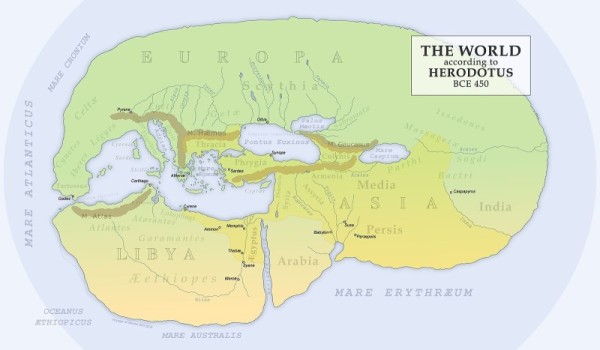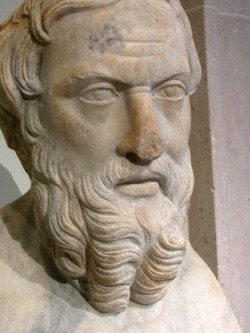To Darius then it seemed that the woman had spoken well, and he let go not only him for whose life she asked, but also the eldest of her sons because he was pleased with her: but all the others he slew.

Translated by George C. Macaulay — our special project presenting the complete Herodotus with URLs for all of those people, places, events, and things which baffles and discourages modern readers.
Previously on Herodotus
119. Upon this they showed themselves to the king and told the cause for which they had suffered this; and Darius, fearing that the six might have done this by common design, sent for each one separately and made trial of his inclinations, as to whether he approved of that which had been done: and when he was fully assured that Intaphrenes had not done this in combination with them, he took both Intaphrenes himself and his sons and all his kinsmen, being much disposed to believe that he was plotting insurrection against him with the help of his relations; and having seized them he put them in bonds as for execution. Then the wife of Intaphrenes, coming constantly to the doors of the king’s court, wept and bewailed herself; and by doing this continually after the same manner she moved Darius to pity her. Accordingly he sent a messenger and said to her: “Woman, king Darius grants to thee to save from death one of thy kinsmen who are lying in bonds, whomsoever thou desirest of them all.” She then, having considered with herself, answered thus: “If in truth the king grants me the life of one, I choose of them all my brother.” Darius being informed of this, and marveling at her speech, sent and addressed her thus: “Woman, the king asks thee what was in thy mind, that thou didst leave thy husband and thy children to die, and didst choose thy brother to survive, seeing that he is surely less near to thee in blood than thy children, and less dear to thee than thy husband.” She made answer: “O king, I might, if heaven willed, have another husband and other children, if I should lose these; but another brother I could by no means have, seeing that my father and my mother are no longer alive. This was in my mind when I said those words.” To Darius then it seemed that the woman had spoken well, and he let go not only him for whose life she asked, but also the eldest of her sons because he was pleased with her: but all the others he slew. One therefore of the seven had perished immediately in the manner which has been related.
120. Now about the time of the sickness of Cambyses it had come to pass as follows:—There was one Oroites, a Persian, who had been appointed by Cyrus to be governor of the province of Sardis. This man had set his desire upon an unholy thing; for though from Polycrates the Samian he had never suffered anything nor heard any offensive word nor even seen him before that time, he desired to take him and put him to death for a reason of this kind, as most who report the matter say:—while Oroites and another Persian whose name was Mitrobates, ruler of the province of Daskyleion, were sitting at the door of the king’s court, they came from words to strife with one another; and as they debated their several claims to excellence, Mitrobates taunting Oroites said: “Dost thou count thyself a man, who didst never yet win for the king the island of Samos, which lies close to thy province, when it is so exceedingly easy of conquest that one of the natives of it rose up against the government with fifteen men-at-arms and got possession of the island, and is now despot of it?” Some say that because he heard this and was stung by the reproach, he formed the desire, not so much to take vengeance on him who said this, as to bring Polycrates to destruction at all costs, since by reason of him he was ill spoken of:

CC BY-SA 2.0 image from Wikipedia.
121, the lesser number however of those who tell the tale say that Oroites sent a herald to Samos to ask for something or other, but what it was is not mentioned; and Polycrates happened to be lying down in the men’s chamber of his palace, and Anacreon also of Teos was present with him: and somehow, whether it was by intention and because he made no account of the business of Oroites, or whether some chance occurred to bring it about, it happened that the envoy of Oroites came into his presence and spoke with him, and Polycrates, who chanced to be turned away towards the wall, neither turned round at all nor made any answer.
122. The cause then of the death of Polycrates is reported in these two different ways, and we may believe whichever of them we please. Oroites however, having his residence at that Magnesia which is situated upon the river Maiander, sent Myrsos the son of Gyges, a Lydian, to Samos bearing a message, since he had perceived the designs of Polycrates. For Polycrates was the first of the Hellenes of whom we have any knowledge, who set his mind upon having command of the sea, excepting Minos the Cnossian and any other who may have had command of the sea before his time. Of that which we call mortal race Polycrates was the first; and he had great expectation of becoming ruler of Ionia and of the islands. Oroites accordingly, having perceived that he had this design, sent a message to him and said thus: “Oroites to Polycrates saith as follows: I hear that thou art making plans to get great power, and that thou hast not wealth according to thy high thoughts. Now therefore if thou shalt do as I shall say, thou wilt do well for thyself on the one hand, and also save me from destruction: for king Cambyses is planning death for me, and this is reported to me so that I cannot doubt it. Do thou then carry away out of danger both myself and with me my wealth; and of this keep a part for thyself and a part let me keep, and then so far as wealth may bring it about, thou shalt be ruler of all Hellas. And if thou dost not believe that which I say about the money, send some one, whosoever happens to be most trusted by thee, and to him I will show
it.”
– Herodotus, Book III
| <—Previous | Master List | Next—> |
Herodotus made his living by being interesting. In a world where most people did not read and could not afford to buy a book even if they could, they would pay to listen to Herodotus recite from his books. They would not pay to be bored. In that world, the names that populate his stories would have some general familiarity to his audience. Their obscurity to us is a barrier that this series seeks to break down.
MORE INFORMATION
MAP LIBRARY
Because of lack of detail in maps as embedded images, we are providing links instead, enabling readers to view them full screen.

Like!! Thank you for publishing this awesome article.